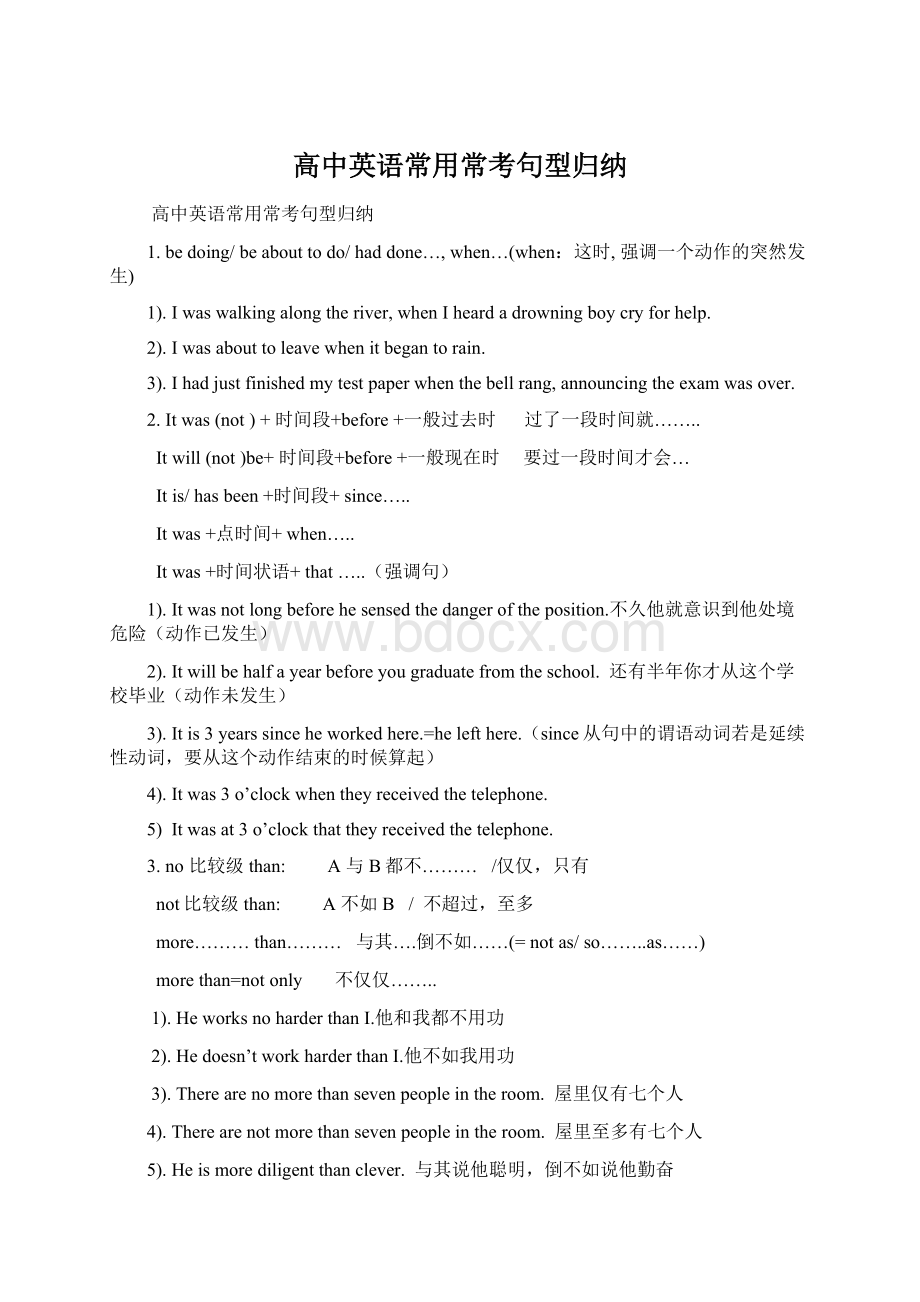高中英语常用常考句型归纳.docx
《高中英语常用常考句型归纳.docx》由会员分享,可在线阅读,更多相关《高中英语常用常考句型归纳.docx(14页珍藏版)》请在冰豆网上搜索。

高中英语常用常考句型归纳
高中英语常用常考句型归纳
1.bedoing/beabouttodo/haddone…,when…(when:
这时,强调一个动作的突然发生)
1).Iwaswalkingalongtheriver,whenIheardadrowningboycryforhelp.
2).Iwasabouttoleavewhenitbegantorain.
3).Ihadjustfinishedmytestpaperwhenthebellrang,announcingtheexamwasover.
2.Itwas(not)+时间段+before+一般过去时 过了一段时间就……..
Itwill(not)be+时间段+before+一般现在时 要过一段时间才会…
Itis/hasbeen+时间段+since…..
Itwas+点时间+when…..
Itwas+时间状语+that…..(强调句)
1).Itwasnotlongbeforehesensedthedangeroftheposition.不久他就意识到他处境危险(动作已发生)
2).Itwillbehalfayearbeforeyougraduatefromtheschool. 还有半年你才从这个学校毕业(动作未发生)
3).Itis3yearssinceheworkedhere.=helefthere.(since从句中的谓语动词若是延续性动词,要从这个动作结束的时候算起)
4).Itwas3o’clockwhentheyreceivedthetelephone.
5) Itwasat3o’clockthattheyreceivedthetelephone.
3.no比较级than:
A与B都不……… /仅仅,只有
not比较级than:
A不如B / 不超过,至多
more………than……… 与其….倒不如……(=notas/so……..as……)
morethan=notonly 不仅仅……..
1).HeworksnoharderthanI.他和我都不用功
2).Hedoesn’tworkharderthanI.他不如我用功
3).Therearenomorethansevenpeopleintheroom. 屋里仅有七个人
4).Therearenotmorethansevenpeopleintheroom. 屋里至多有七个人
5).Heismorediligentthanclever. 与其说他聪明,倒不如说他勤奋
àHeisnotas/socleverasdiligent.
6)Itismorelikeameetingthanlikeaparty.-->Itisnotasapartyasameeting
7).Mr.Zhangismorethanmyteacher,heisalsomybestfriend.张先生不仅仅是我的老师,他还是我的朋友
4.once…..一旦…..,表示时间和条件
1)Onceyouunderstandwhattheteacherexplained,youwillhavenodifficultydoingthework.
2).Onceyouhavedecidedtodosomething,youshouldfinishitanddoitwell.
5.The+比较级…….,the+比较级……..越……,越……
1)Themorebooksyouread,themoreknowledgeyouwillget.
2)Thebusierheis,thehappierhefeels.
6.asif/asthough…..(表示与事实相反,用虚拟;若表示即将成为事实或有可能成为事实,则用陈述语气)
1).Hewasingreattrouble,butheactedasifnothinghadhappened.
2).Althoughtheyjustmetforthefirsttime,theytalkedasiftheyhadbeenfriendsformanyyears
3).Thecloudsaregathering.Itlooksasifitisgoingtorain.
7.n./adj./ adv./ v.+as/though+主语+谓语,……尽管……,…….引导让步状语从句
1).Childasheis,IalreadyknowwhatcareerIwanttofollow.
2).Tryashemight,hecouldn’tsolvetheproblem.
3).MuchasIrespecthim,Ican’tagreewithhisidea.
8.whether….or…. 无论是….还是….
1).Whethertheweatherisgoodorbad,theywillsetoffastheyplanned.
2).Anyperson,whetheryoungorold,hashisownworth.
9.疑问词+ever=nomatter+疑问词,引导让步状语从句或名词性从句
1).Whichever(=Nomatterwhich)youlike,youcantakeitaway .(让步状语从句)
Youcantakeawaywhichever(=anyonethat)youlike (名词性从句)
2).Wheneveryoucomes,youwillbewelcome.(让步状语从句)
3).Whateverhappens,Iwillsupportyou.(让步状语从句)
4).Whoeverbreaksthelaw,hewillcertainlybepunished.(让步状语从句)
àWhoeverbreaksthelawwillcertainlybepunished.(名词性从句)
5).Howevergreatthedifficultyis,wecanovercomeit.(让步状语从句)
10.if/aslongas/solongas/providingthat/providedthat/supposingthat/onconditionthat 假如…..
1).Iwilllendyoumoneyonconditionthatyoucanreturnitwithin3months.
11.giventhat/consideringthat考虑到…..,鉴于……
1).Givenherinterestinchildren/Giventhatsheisinterestedinchildren,I’msureteachingistherightcareerforher.
2).Consideringhisageandhisexperience,hehasdonewell.
12.incasethat/incaseof….. 万一…..,以防…..
1).Incaseoffire,pleasedial119atonce.
2).IncasethatJohncomes/Johnshouldcome,tellhimtowait.
13.祈使句+or/otherwise+结果句 或 祈使句+and+结果句
1).Stopdoingsuchfoolishthing,oryouwillbepunishedintime.
2).Moreeffort,andtheproblemwouldhavebeensettled.
3).Thinkitover,andyouwillfindtheanswer.
14.so/such……..that…….引导结果状语从句时须注意
[1]当名词前many,much,little,few有修饰时,用so不用such因为此时的中心词不再是名词,而是many,much,little,few这些表示数量的词。
1).Thewesternerseatsomuchfatandsugarthattheyputonweighteasily.
2).Therearesofewfishinthelakethatwecouldn’tfishthemeasily.
[2] 当名词是单数可数名词,前面又由adj.修饰时,注意冠词的位置,即so+adj+a(n)+n或such+a(n)+adj.+n
1).Heissuchanhonestperson/sohonestapersonthatyoucandependonhimwhenyouareintrouble.
[3] 当so/such引导的部分位于句首时,主句要用部分倒装结构
1).Suchgreatprogresshashemadeinhisstudiesthatwealladmirehim.
[4] 当主从句主语一致时可与动词不定式相互转换,即变成so/such…….astodo结构。
1).Thewesternerseatsomuchfatandsugarastoputonweighteasily.
15.sothat引导目的状语从句与结果状语从句
[1] sothat引导目的状语从句时常与情态动词连用(=inorderthat),当主从句主语一致时可转换为soastodo/inordertodo.
1).Heturneduptheradioalittlesothathecouldhearthenewsclearly.
Heturneduptheradioalittlesoastohearthenewsclearly.
2).Heclosedallthewindowswhiledrivingsothatheshouldn’tcatchcold.(否定句中情态动词用shouldn’t)
[2] sothat引导结果状语从句一般不与情态动词连用
1).Heturneduptheradioalittlesothatheheardthenewsclearly.
16.cannever/can’t与too,toomuch,enough,over-搭配表示“无论怎样….都不过分”
1).Whileyouaredoingyourhomework,youcan’tbecarefulenough.
2).Heissuchagreatmanthatwecan’tpraisehimtoomuch.
3).WilliamHartleywashandsome,determinedandhardworking,inaword,Icouldn’tspeaktoohighlyofhim.
4).ThedevelopmentofsocietyhasmadeitnecessaryforustohaveagoodknowledgeofEnglish,sowecan’toveremphasizetheimportanceoflearningEnglish.
5).Sinceitisagoodthing,wecan’tdoittoosoon.
17.不定式作主语,it作形势主语:
It+系动词+adj./n..+forsb.todo (forsb.表示动词不定式动作的执行者)
It+系动词+adj.+ofsb.todo (ofsb.既表示动词不定式动作的执行者有表示人所具备的性质或特征)
1).It’simportantforustohaveagoodknowledgeofEnglish.
2).Howrudeofhimtotreatachildlikethat!
3).It’sthoughtfulofhimtofixusupforthenight.
18.不定式作宾语,it作形势宾语:
主语+think/consider/believe/make/feel+it+adj./n.+forsb./ofsb.+todo
1).Ifeelitfoolishofhimtobelievesuchaman.
2).Thetimelyrainhadmadeitpossibleforthecropstogrowwell.
19.won’t/can’thavesb.doing/done不能容忍某行为发生
1).Youaretoorude,andIwon’thaveyouspeakingtoMotherlikethatagain.
2).Wecan’thaveanythingdoneagainsttheschoolrules.
20.Itissaid/thought/hoped/believed…..that……
Sb.issaid/thought/hoped/believedtodo…..
1).Itissaidthatheisstudyingabroad.-->Heissaidtobestudyingabroad.
2).ItisconsideredthatmanycountrieshighlyvalueChina’sroleinhelpingworld’speace.
àManycountriesisconsideredtohighlyvalueChina’sroleinhelpingworld’speace.
21.表示过去原打算干,却未曾实现的愿望、打算或意图
[1] hadhopedtodo=hopedtohavedone.。
类似的词还有:
expect,think,intend,design,plan,mean,suppose等
[2] wouldlike/prefer/lovetohavedone
[3] was/weretohavedone
[4] was/weresupposedtohavedone
1).---Didyougotoseethefilm“Titanic”lastnight?
---I’dliketohave,butIhadanunexpectedguest.
2).Theplanewastohavetakeoffat7thismorning,butwasheldupbytheheavyfog.
22.Howdidsbcometodo…..?
=Howcomethat….为什么会…../……是怎么回事?
表示要求对所发生的事情说明理由或做出解释
1).Howdidyoucometofindoutwhereshe’sliving?
=Howcomethatyoufoundout….
你是怎么打听到她住在哪儿的?
2).Howcomethatyousatthere,doingnothing?
为什么坐在那儿什么也不干?
3).Howdidhecometobesofoolish?
23.Itis(not)likesb.todo….. ….(.不)像某人的所作所为
1).It’slikehimtoanswerforwhathehasdone.敢对自己的行为负责,这是他的一贯作风
2).It’snotlikehimtohavebeensorudetohismother.
24.whenitcomesto….. 当谈到或涉及到……
1).Heisamanoffewwords,butwhenitcomestoplayingcomputer,hewillbeexcitedandfullofenergy.
2).Whenitcomestohelpinghiswifewiththehousework,Johnnevercomplains.
25.everytime/eachtime/nexttime/thefirsttime/anytime等短语引导时间状语从句,表示“每当…..,每次…..,下次…..”
1).Everytimeyoumeetwithnewwordswhilereading,don’talwaysrefertoyourdictionary.
àWhenyoumeetwithnewwordseverytime…..
2)Nexttimeyoucome,doremembertobringyoursonhere.
3)Youarewelcometocomebackanytimeyouwantto.
26.Thereis(no)needtodo…../for….-àItis(not)necessaryforsb.todo….
Thereis(no)hope/chance/possibilityofdoing….
Thereis(no)difficulty/trouble/point/delay(in)doing
1).Isthereanychanceofus/ourwinningthematch?
2).Thereisnopointindiscussingtheproblemagain.
27.Itisuptosb.todosth. 应由某人来做某事……..
1)---Whenshallwestartout?
---It’suptoyoutodecide.
2).It’suptoyoutobabysitmysowhileIamawayonbusiness.
28.beuptosth. 忙于…..,从事…….,胜任…..
1).Johnisn’treallyuptothatjob.约翰不适合干那项工作
2).Whathaveyoubeenuptorecently?
最近你一直在忙些什么
29.Itistimetodo/Itistimethat+主语+动词的一般过去式 该是做…..的时候了
Itistimethatweendedthediscussion.
30.it强调句:
[1] 基本构成形式:
Itis/was+被强调部分+who/that+原句剩余部分
e.g.:
Imethiminthestreetyesterdayafternoon.
ItwasIwho/thatmethiminthestreetyesterdayafternoon.(强调是我,不是别人)
Itwashimwho/thatImetinthestreetyesterdayafternoon.(强调我遇见的是他,不是别人)
ItwasinthestreetthatImethimyesterdayafternoon.(强调是在大街上,不是在别的地方,强调的是地点,但不用where)
ItwasyesterdayafternoonthatImethiminthestreet(强调是昨天下午,不是在别的时候,强调的是时间,但不用when)
[2] 强调句的一般疑问句:
Is/Wasit+被强调部分+who/that+原句剩余部分
[3] 强调句的特殊疑问句:
What/When/Where/Who/How……is/wasit+who/that+原句剩余部分
1).Whowasitthat/whoyoumetinthestreetyesterdayafternoon?
Tellmewhoitwasthat/whoyoumetinthestreetyesterdayafternoon?
31.do,did,does用于强调谓语动词,加强语气
1).Heisagoodstudent.-->Hedoesbeagoodstudent
2).Hehelpedusyesterday.àHedidhelpusyesterday.
3).Becareful!
àDobecareful!
32.Therebe句型:
[1] therebe之后如有几个并列主语,be动词的选择要取决于第一个主语,即就近原则。
1).Thereisap